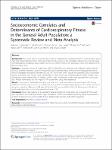Socioeconomic Correlates and Determinants of Cardiorespiratory Fitness in the General Adult Population: a Systematic Review and Meta-Analysis
Ombrellaro, Katherine J.
Perumal, Nita
Zeiher, Johannes
Hoebel, Jens
Ittermann, Till
Ewert, Ralf
Dörr, Marcus
Keil, Thomas
Mensink, Gert B. M.
Finger, Jonas D.
Background
This review aims to (1) consolidate evidence regarding the association between socioeconomic status (SES) and cardiorespiratory fitness (CRF), (2) conduct a meta-analysis of the association between SES and CRF using methodologically comparable data, stratified by sex, and (3) test whether the association varies after adjustment for physical activity (PA).
Methods
A systematic review of studies from MEDLINE, EMBASE, Latin American and Caribbean Health Sciences (LILACS), Scientific Electronic Library Online (ScIELO), and Cochrane Library without time or language restrictions, which investigated associations between SES and CRF. Risk of bias within studies was assessed using a customized quality assessment tool. Results were summarized in table format and methodologically similar studies were synthesized using meta-analysis of Hedges’ g effect sizes. Synthesized results were appraised for cross-study bias. Results were tested for the impact of PA adjustment using meta-regression.
Results
Compared to individuals with low education, both men and women showed higher CRF among individuals with high education (men 0.12 [0.04–0.20], women 0.19 [0.02–0.36]), while participants with medium education showed no significant difference in CRF (men 0.03 [− 0.04–0.11], women 0.09 [− 0.03–0.21]). Adjustment for PA did not significantly impact the association between education and CRF.
Conclusions
There is fair evidence for an association between high levels of education and increased CRF. This could have implications for monitoring, of health target compliance and of chronic disease risk among higher risk populations, to detect and prevent non-communicable diseases (NCDs) and to diminish social health inequalities.

